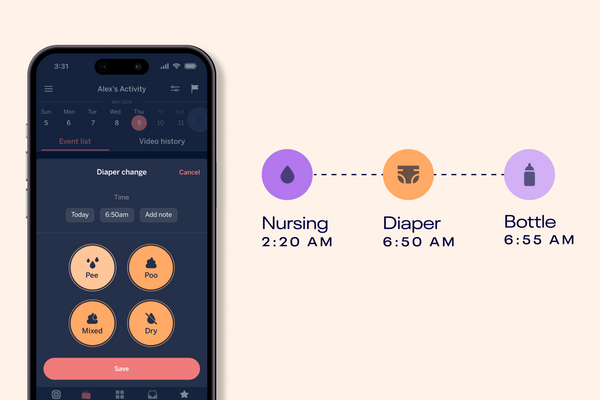Ever wonder why your friend is brimming with energy before the sun rises while you're hitting snooze for the fifth time? Or why your partner is ready for bed at 9pm while you’re just getting into your groove? Welcome to the fascinating world of chronotypes, the secret to unlocking your optimal daily rhythm. Understanding your chronotype can be a game-changer for your health, productivity and relationships, so let’s dive into everything you need to know so you can best get the sleep you need.
What Exactly is a Chronotype?
A chronotype is your body's natural inclination to sleep and wake at certain times. It’s like your personal internal clock, dictating when you feel alert or sleepy, when you're most productive, and even when you're likely to be hungry. Understanding your chronotype can help you tailor your schedule to fit your natural rhythms, leading to a more harmonious and productive life.
“All of us have an innate chronotype, in that everyone has a natural inclination to fall asleep at a certain time,” Dr. Sujay Kansagra (@thatsleepdoc) told our own Dr. Maristella Lucchini (Nanit Lab) at a recent Parent Like a Pro Summit. “It’s dependent on genetics and age. In young adulthood, we have a shift towards night hours. In our later years, we tend to be early birds. You can figure out your natural chronotype by taking a test online to help you see patterns and better understand your unique needs.”
Meet the Chronotypes: Bear, Lion, Dolphin, and Wolf
Forget the old-school early bird and night owl labels; today’s chronotypes are far more sophisticated and nuanced. Let’s get to know the four main types: Bear, Lion, Dolphin, and Wolf.
The Bear: The Daytime Champion
If you find yourself syncing well with the rise and fall of the sun, you might be a Bear. Bears make up about 50% of the population and their energy peaks during daylight hours. They typically wake up and go to bed easily, and their productivity ebbs and flows with the sun.
Why it Matters:
- Best Time for Productivity: Bears should tackle important tasks mid-morning, when they’re at their most alert.
- Health Tip: Ensure you get plenty of sunlight during the day to maintain your energy levels.
- Relationship Insight: Bears should plan social activities and workouts during daylight to match their natural energy peaks.
Lifestyle Tips for Bears:
- Morning Glory: Schedule important meetings and tasks for mid-morning.
- Sunshine Boost: Get plenty of natural light during the day.
- Early Wind Down: Create a relaxing evening routine to signal it’s time to sleep.
The Lion: The Early Riser
Lions are the go-getters of the early morning. They wake up at dawn and often feel most productive before lunchtime. By evening, they’re winding down and ready for bed early.
Why it Matters:
- Best Time for Productivity: Lions excel at tackling their to-do lists early in the morning.
- Health Tip: Avoid heavy meals and caffeine late in the day to ensure a good night’s rest.
- Relationship Insight: Communicate with your night owl friends and partners to plan activities that respect your early bedtime.
Lifestyle Tips for Lions:
- Early Bird Tasks: Tackle big projects first thing in the morning.
- Light Dinners: Avoid heavy meals late in the day.
- Evening Relaxation: Wind down activities before your early bedtime.
The Dolphin: The Sleep Struggler
Dolphins are light sleepers who often struggle with insomnia. They are the rarest chronotype, known for being highly intelligent but having erratic sleep patterns. Dolphins tend to wake up feeling unrefreshed and hit their stride in the late morning.
Why it Matters:
- Best Time for Productivity: Dolphins should schedule demanding tasks for late morning or early afternoon.
- Health Tip: Establish a strict sleep routine and create a calming bedtime environment.
- Relationship Insight: Be understanding of your unique sleep needs and communicate them to those around you.
Lifestyle Tips for Dolphins:
- Late Morning Start: Schedule key tasks for late morning.
- Strict Routine: Stick to a consistent sleep schedule.
- Calm Nights: Create a peaceful bedtime environment to aid sleep.
The Wolf: The Night Owl
Wolves are the quintessential night owls, feeling most alive when the sun goes down. They often struggle to wake up early but hit their peak productivity in the late afternoon and evening.
Why it Matters:
- Best Time for Productivity: Wolves should schedule creative and demanding tasks for the evening.
- Health Tip: Gradually adjust your wake-up time if you need to align more closely with the typical workday.
- Relationship Insight: Respect your need for a later schedule and plan social activities accordingly.
Lifestyle Tips for Wolves:
- Evening Productivity: Plan your most demanding tasks for late afternoon or evening.
- Gradual Wake Up: Slowly adjust your wake-up time if needed.
- Respect Night Time: Acknowledge your need for a later schedule and plan accordingly.
Why Understanding Your Chronotype Matters
Knowing your chronotype isn’t just a fun personality quiz result; it has real implications for your health, productivity, and overall well-being. By aligning your tasks with your natural energy peaks, you can get more done with less effort. Bears and Lions should tackle high-focus tasks in the morning, while Wolves and Dolphins might save their heavy lifting for later in the day.
Improve Your Health
Chronotype misalignment, such as a Wolf trying to conform to a 9-5 schedule, can lead to sleep disorders, stress, and even chronic health conditions. By honoring your natural rhythm, you can improve sleep quality, boost mental clarity, and enhance overall health.
Enhance Your Relationships
Understanding that your partner, friends, or colleagues might have a different chronotype can improve communication and reduce friction. Plan activities and discussions for times when everyone is at their best to foster better interactions.
Understanding Your Chronotype
Curious about which chronotype you are? There are plenty of online quizzes designed by sleep experts to help you determine your type. Once you know, you can start making small adjustments to better align your lifestyle with your natural rhythms.
Understanding and embracing your chronotype is about more than just sleep; it’s about living in harmony with your body’s natural rhythms. Whether you're a daylight-loving Bear, an early-rising Lion, an insomniac Dolphin, or a nocturnal Wolf, recognizing your unique pattern can help you live a healthier, more productive, and happier life.
So next time you're struggling to fit into someone else's schedule, remember: it’s not you, it’s your chronotype. Embrace it, optimize your life around it, and enjoy the benefits of living in sync with your internal clock. Here's to a life perfectly timed!
To learn more about chronotypes and how they work, Dr. Maristella breaks down the three most common types as part of Nanit’s Techtok series. Check out the video below.
@getnanit Chronotypes 🤝 parenting #nanittechtoks #parentsleep #chronotypes #sleepover ♬ Sunshine - WIRA



































